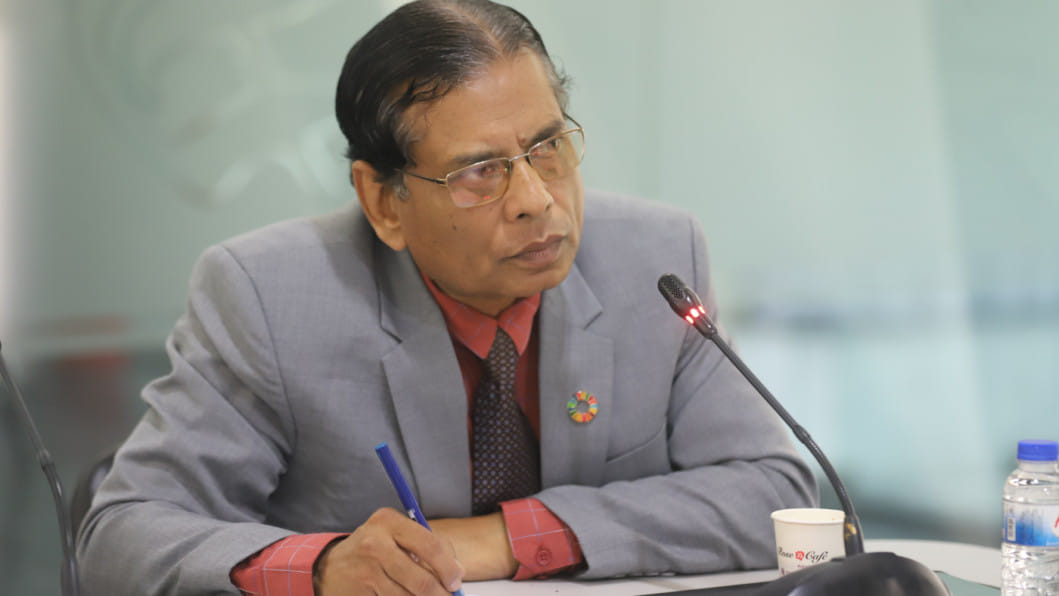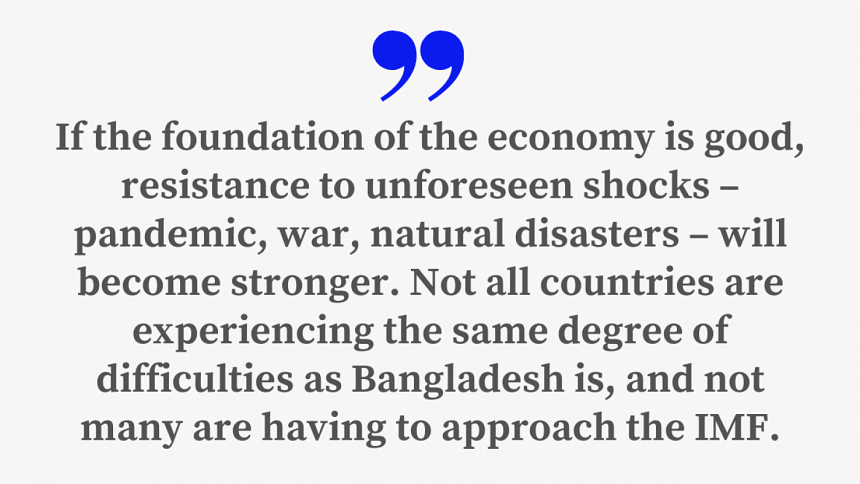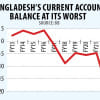Revisit process of policymaking, not just the policies

Dr Mustafizur Rahman, Distinguished Fellow at the Centre for Policy Dialogue (CPD), talks to Eresh Omar Jamal of The Daily Star about Bangladesh's growing current account deficit and other economic challenges.
In September, Bangladesh's current account deficit sank further into red. What is driving this deficit and how worried should we be?
Forex reserves came down from USD 46.4 billion in June 2021 to USD 41.8 billion in June 2022, a clear reversal of the trends of the past decade. In the first quarter of the ongoing fiscal year, exports and remittances did post some rise, of 14.3 percent and 4.8 percent respectively. However, this is not adequate to cover the rise in import payments by about 11.8 percent, amounting to more than USD 2 billion. This transmitted a worrying sign for the economy.
However, if we consider the first four months of the current fiscal year, the picture is somewhat mixed. In the first two months, exports and remittances were rising, but in September and October they were lower than the previous two months. Fears of recession in major markets, and the rising gap between formal and informal exchange rates, were two possible reasons behind this.
We do not have the actual import figure for October 2022 yet, but early signs of a fall in import payments are already there. The government's policy of reducing imports through import bans and raising letter of credit (LC) margins, as well as reduced demand due to costlier foreign currencies, have started to take effect. The dearth of foreign currency for opening LCs was also a reason, which will be reflected in actual import payments in the coming days.
The exchange rate for remittances has been revised upward recently. More than 1.5 million people have gone abroad since January 2021 and inflows of remittances are likely to go up in the near-term future. It is possible that the reserve situation will see some improvement over the next few months, especially after the loans that are being negotiated by the government.
However, the burden of imported inflation and supply-side implications of reduced imports will have adverse implications for economic growth and welfare, particularly of marginalised people.
Has the government taken adequate measures to turn the deficit around? What more can they do?
When the impacts of the global shock started to be felt in the economy, the government responded through a number of measures. However, the actions have been more reactive than proactive.
No one could predict the Russia-Ukraine war's impact on global prices of fuel, food, fertiliser and other commodities. This had led to a significant increase in import payments, resulting in rising trade and current account deficits, which in turn resulted in a drawdown in forex reserves. However, three factors have accentuated the adverse situation.
Firstly, the taka remained appreciated for a long time, which undermined the competitive strength of exporters and created disincentives for remittance senders. Multiple exchange rates, which were introduced later, proved to be inadequate and suffered from lack of coherence and predictability.
While the fear of imported inflation was not without foundation, gradual depreciation over the past few years would have helped markets to reach a new market equilibrium. Now, we had to go for significant depreciation at a time when global prices are high. As a result, the adverse impacts of imported inflation have led to a significant undermining of welfare and erosion of purchasing power, particularly of low-income people.
Secondly, the lack of strong steps against money laundering, capital flight, trade mispricing and operation of illegal informal markets have made the situation worse. This had adverse implications on reserves in particular, but also on availability of foreign currency in the market in general. We have many laws and regulations in place, and also institutions such as the Financial Intelligence Unit, Transfer Pricing Cell, and Anti-Corruption Commission. Not only were existing laws not enforced; rather wrong signals were given when fiscal measures were announced in the latest budget to entice the repatriation of money taken out of the country illegally.

The third relates to reserve calculation – an issue the IMF had raised some time back. However, no clarification was given by the central bank when this was first flagged. It is not so much a question of dollars not being in the system – these were used in the worthy causes of export development, infrastructure building, etc – but about knowing what amount will actually be available when there is demand, be it for imports, debt servicing or other needs.
Strategic thinking rather than fire-fighting should have informed exchange rate management in particular, and monetary policy management in general. Making the exchange rate more market aligned, enforcement of legal measures against capital flight, and evidence-based policymaking will be crucial in going forward.
Bangladesh recently struck a deal with the IMF for loan assistance, and is also negotiating with the World Bank for a USD 2 billion financial support package. How much can they help to overcome our economic problems?
This will be the 13th time Bangladesh is borrowing from the IMF, but the first time in the last decade. The IMF's BoP support of USD 4.5 billion, to be extended over next three years, is in itself not a significant amount, and the first instalment of about half a billion is expected only in February 2023.
However, the IMF loan has signalling importance. Some of the steps that have been discussed, if implemented, will help stabilise the market, as will additional budgetary and targeted support from other multilateral organisations. All these will hopefully contribute to the improvement of the reserve situation and, more importantly, help reduce the prevailing uncertainties in the foreign exchange market.
However, in view of the current pace of depletion of reserves, the loans in themselves will have limited impact. On the other hand, the steps being discussed will have demand-side implications, and to that extent is expected to have positive impacts also on forex reserves. The recommendations and understandings will need to be codified in terms of quantitative targets and milestones, and reflected in the letter of intent from Bangladesh, which will set the stage for the formal endorsement of the IMF loan.
Many of the issues raised during IMF discussions, including banking sector reforms, institutional strengthening, enforcement of rules and regulations, central bank autonomy, raising the capacity of the National Board of Revenue, enhanced domestic resource mobilisation, rationalisation of public expenditure, etc are necessary towards more effective macroeconomic management. Bangladesh's concerned stakeholders, economists and experts have been drawing attention to these measures for a number of years. Ownership of the reform agenda and the political will to enforce it will be crucial – not so much to get the IMF loans but for much-needed good governance.
If the foundation of the economy is good, resistance to unforeseen shocks – pandemic, war, natural disasters – will become stronger. Not all countries are experiencing the same degree of difficulties as Bangladesh is, and not many are having to approach the IMF.
Our current economic struggles have been primarily attributed to external shocks by the government. Is that a fair assessment?
Global shock is a triggering factor, but there are a number of underlying reasons that accumulated over the years and accentuated the adverse impacts on the Bangladesh economy. Thanks to our steady economic growth of recent years, we now have a USD 440 billion economy. Economic development brought along a new generation of challenges in managing our middle-income economy. Against this backdrop, the economic growth of the past cannot be sustained without strengthening good governance and significantly raising the efficacy of concerned institutions.
Take for example the banking sector, considered to be a vital nerve-centre of an economy. Regrettably, not only was there a lack of reforms that would strengthen the capacity of the sector, we have witnessed the reversal of measures taken earlier to improve the state of governance in the sector. The significant rise in default loans, by about six times over the last decade and a half, and siphoning off of thousands of crores of taka from the banking system, often through illegal means and capital flight, deprived the country of investible resources for businesses, enterprises and entrepreneurs. These had important implications for domestic resource mobilisation, potential export earnings, and for the replenishment of forex reserves.
The suggestion of setting up a Banking Commission to come up with concrete recommendations, to be implemented in a time-bound manner, I think merits serious consideration by policymakers, particularly given the emergent situation.
Our response to capital flight through illegal channels has been muted, to say the least. Our domestic resource mobilisation has not kept up with our economic growth. On the other hand, autonomy of key institutions where independence and evidence-based policymaking would have strengthened the government's hands and bolstered underlying macroeconomic soundness suffered significant erosion.
I would venture to say that we should take the prevailing challenging situation as an opportunity to revisit not just our policies, but also the process of policymaking. We must draw necessary lessons to inform our journey forward. IMF borrowing is a transitory phenomenon; we will no doubt be able to overcome current difficulties, but can we meet our developmental aspirations? The right lessons from the emergent scenario must be drawn so that we can avoid the middle-income trap experienced by many developing countries following initial economic success.

 For all latest news, follow The Daily Star's Google News channel.
For all latest news, follow The Daily Star's Google News channel. 











Comments